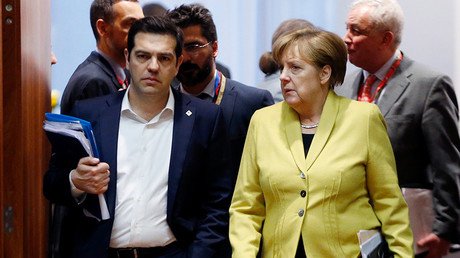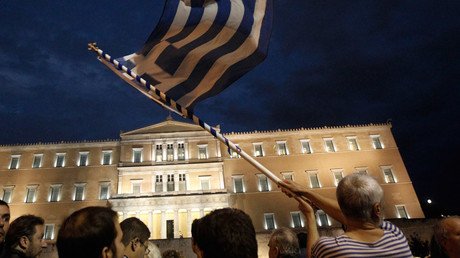‘Creditors have many sinister ways to keep debt serf Greece paying forevermore’
International creditors use their financial dominance to push Greece into paying its debts “forevermore” and want their debt peon to serve as an example to the UK in case it dares to pull out of the EU, professor of binary economics, Rodney Shakespeare, told RT.
On Saturday WikiLeaks published a document exposing a conversation between two International Monetary Fund (IMF) officials in charge of managing the ongoing Greek debt crisis. The report said that the IMF threatened to pull out from Greek bailout program if Germany refused to provide debt relief to the country.
RT: It sounds like the IMF and Germany have different views on how to handle the Greek debt crisis. What do you think the IMF is hoping to achieve?
Rodney Shakespeare: The views aren’t very different. Both of them are in the business of forcing individuals into debt, organizations into debt , countries into debt – unrepayable debt. Greece debt to GDP is 180 percent. And the effect of that, of course, is that countries and individuals go on paying forevermore. They only quarrel over whether you push a country too far, so that it can’t do it.
They want to keep a country in existence paying up forevermore. Now, they could do that, in this case, in several nasty ways. The threat on Greece, first of all, is to declare a default, and that will freeze the system. Secondly, they could declare a bail-in of all the money in the Greek banks, and Greek depositors would lose all their money.
There are other sinister possibilities by which the IMF and the West, generally, can use threats against Greece to force it to bend to their will, which is so that it becomes a debt serf or a debt peon forevermore.
RT: Now what do you expect Germany’s response will actually be?
RS: Germany takes the tougher line and thinks that Greeks can be screwed forevermore. What it couldn’t do via the Second World War, it now wishes to do by an economic and financial dominance. That’s totally irresponsible. Greece cannot repay that.
You want to remember that there are other possibilities to screw Greece at this moment. Greece is very vulnerable to Daesh [Islamic State, IS, formerly ISIS/ISIL terror group] and you may find in mysterious ways that the number of refugees flooding into Greece –after all, the West is hand in glove with Turkey and Saudi Arabia – and you may well find that some Daesh atrocities suddenly start happening in Greece.
The West and Germans, in particular, are going to reinsure that Greece becomes a debt peon and agrees to pay more and more forevermore. It’s a nasty situation. And on top of that, they want to use Greece as a lesson for the UK, and to say if you dare pull out of Europe we will do to you what we are doing to Greece.
RT: The government has actually called on the IMF to explain whether it want to push the country towards bankruptcy. Is that actually what the IMF is trying to do?
RS: They want Greece to continue to pay. If the thing actually goes into bankruptcy, then the whole thing collapses effectively and Greece will probably be forced out of Europe.
So it’s a game of pushing, and pushing to screw the Greeks, to make them pay and to use these threats – and they are very very serious threats, basically: ‘If you don’t pay we’ll just smash you.’
That is the game, and it’s not good that the European Commission seems to be taking a slightly softer line. It can see it is a very serious situation that the Greeks might just at the end of the day say, "we are going to pull out of the euro." That would be very bad because Greece is not actually prepared for that.
So it’s a very difficult situation in which the bankers who want to get blood out of the stone and take that blood forevermore. All of this isn’t necessary. The European Central bank can be used directly for big public capital projects, for the spending which creates the jobs, but they’ve no intention of doing that.
The statements, views and opinions expressed in this column are solely those of the author and do not necessarily represent those of RT.














